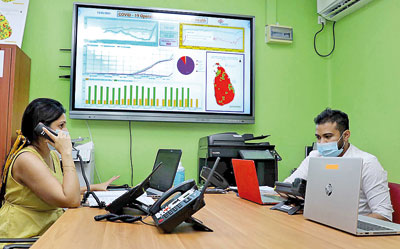News
Health Ministry radiates morale booster & supportive supervision

Dr. Hemantha Herath
There are no standard procedures or internationally declared guidelines to differentiate between ‘travel restrictions’ and ‘lockdowns, said a top health official, pointing out that both mean that there would be travel restrictions.
The Health Ministry’s Disaster Preparedness and Response Division head, Dr. Hemantha Herath, said that usually these words are used interchangeably. When it comes to travel restrictions, it means that there are restrictions, but travel has not been stopped completely. A lockdown implies – but is not defined – that there will be no movement in and out of that area. This is why in a place where there is a lockdown, we expect the public to stay put until the lockdown is lifted.
“The degree to which travel restrictions are imposed can vary from very mild to very strict depending on the severity of the issue or need, where they will almost amount to a lockdown,” he said.
What is the ground situation?
Under the concept of “supportive supervision”, the nine provinces have been assigned, depending on their size, to one or two Deputy Directors General (DDGs), said Dr. Herath. Last weekend, all of them fanned out across the country on visits to COVID-19 treatment centres (hospitals and Intermediate Care Centres – ICCs).
Having been assigned the Central Province, he along with two directors had in a two-day visit gone to numerous locations.
Paying tribute to the healthcare staff managing patients in a pandemic situation, Dr. Herath said that sometimes with limited resources they were doing their job happily and willingly. “Therefore, it is our duty and obligation as the Health Ministry to support them as much as possible.”
There are two types of needs, he said, adding that one is the general capacity compared to the need. This means they have many patients and beds but only one nursing officer or other staff. The second is those who have an adequate number of beds but need linen, plates, cups, as the patients who get discharged sometimes take this stuff home with them. Then there are also simple needs like a washing machine to ease the workload or a kettle to make a cup of tea when weary.
| Bridge over troubled waters Gentle but confident voices alleviate worries, pacify the disgruntled and provide valuable information……..we see and hear them in the Disaster Preparedness and Response Division on Thursday evening. This is a service, the division has been providing since the pandemic hit the country last year, with eight young doctors who have concluded their internship and are awaiting their next posting, fielding the calls of desperate people caught in a crisis. Dr. Chiran Colombage, Dr. Kirushanth Sathyanadan, Dr. Chathuranga Balasooriya, Dr. Dakshini Egodawatte, Dr. Isuru Probodha, Dr. T. Panduwawela, Dr. Thejani Gunathilaka and Dr. Hasini Karunarathna work in shifts to “man” the 24-hour hotline: 011-7966366. They also act as a “bridge” when people are unable to contact the other hotlines, while advising those who need medical guidance.
 Dr. Dakshini Egodawatte and Dr. Chiran Colombage ‘on call’. Pic by M.A. Pushpa Kumara | |


